The Choice of Research Topic
Increased income result in increased living standards. As a result, tourism gains popularity among the citizens of the United Kingdom.
Statistics:
- The amount of money British people spent on holidays grew by 6.3 % between 2012 and 2013.
- The amount of time British residents spent abroad increased by 3.5 % (Travel Trends, 2013 par. 10).
- In 2014-2015, 20 % of the citizens project larger investments into their own holidays (Caution remains in 2014 but Brits expect to spend more on holidays in 2015 par. 1).
The presented research reveals and discusses the value of holidays for the British people.
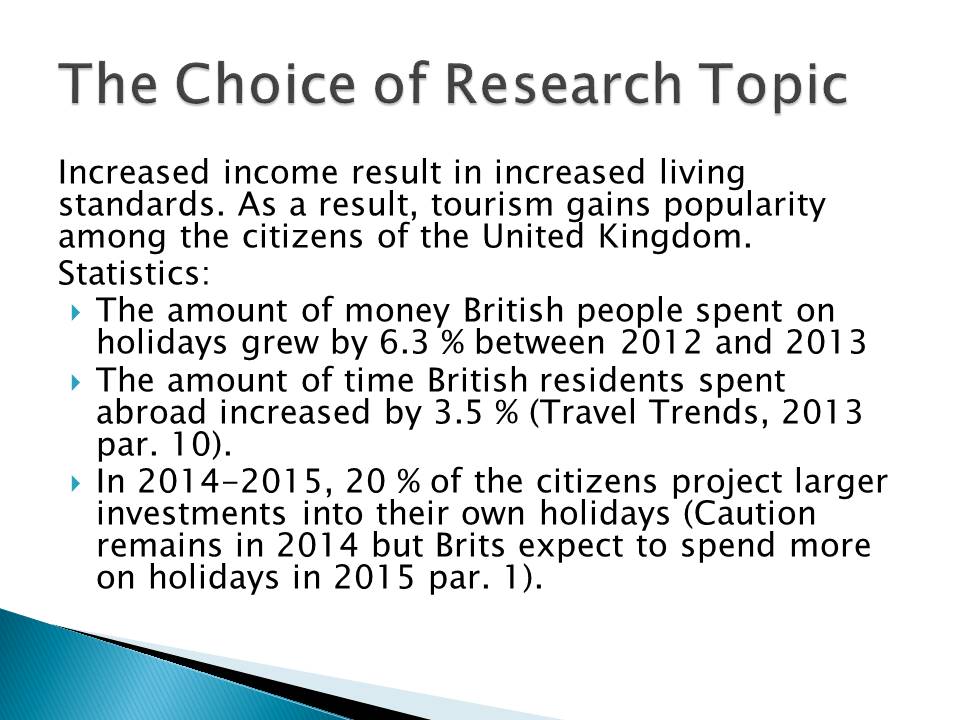
Methodology
- Reason: to determine the importance of holidays for British people, to find out their most preferred destination.
- Data collection method: questionnaire.
13 questions targeting:
- Holiday experiences;
- Favourite activities;
- Holiday planning;
- Reasons to choose destinations.
Participants:
- 40-50 people;
- Ages 21 to 50;
- Sourced in the city centre of Newcastle.
Apart from the main points of the research, the paper will also discuss the demographics of the participants which includes their age and gender. Moreover, the willingness of the British people to have holidays and the frequency with which they go on vacations will be mentioned. Furthermore, the research will present answers to the three main questions that are “where do the British people prefer to spend their holidays?”, “ what are their travel experiences?”, and “how do they arrange their holidays”.
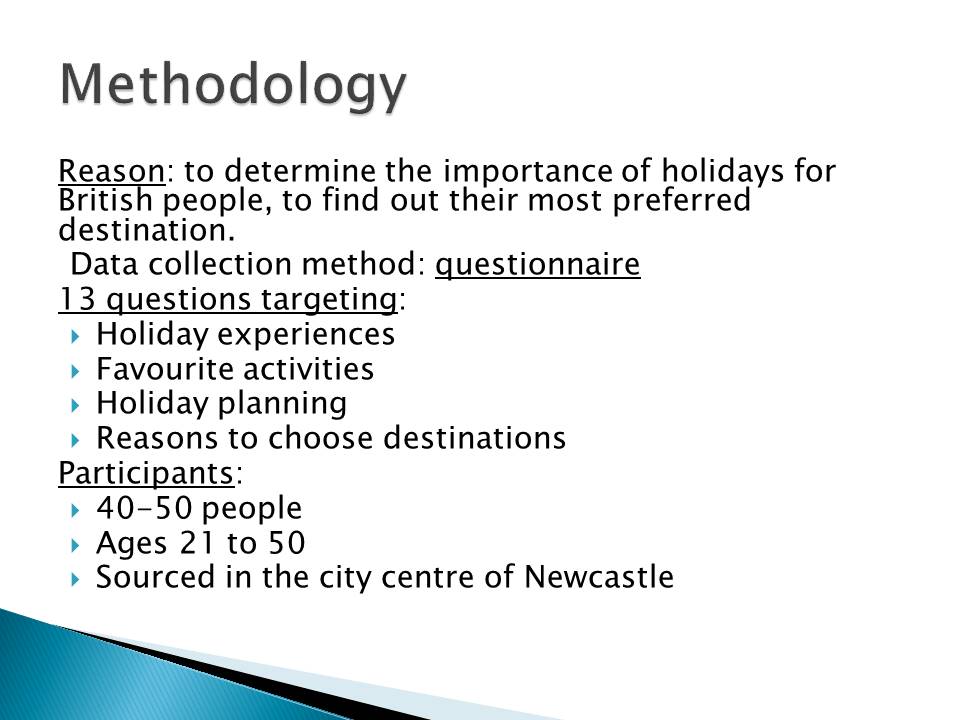
Demographics
In total, 50 people answered the questions of the survey. The comparison of the demographics of the participants demonstrates the diversity of the respondents, yet shows that the number of males and females taking part in the research is almost equal. Besides, the age group from 21 to 30 is dominant among both genders. The least represented groups of participants are those younger than 21 and those older than 51. If the former rarely travel independently, the latter represent a significant groups of travelers since many of them are pensioners and enjoy taking trips. Overall, the diverse representation of most of the age groups adds to the validity of the survey results and allows comparison of the holiday-related opinions of the people of Newcastle and the possible responses of the citizens of the United Kingdom in general.
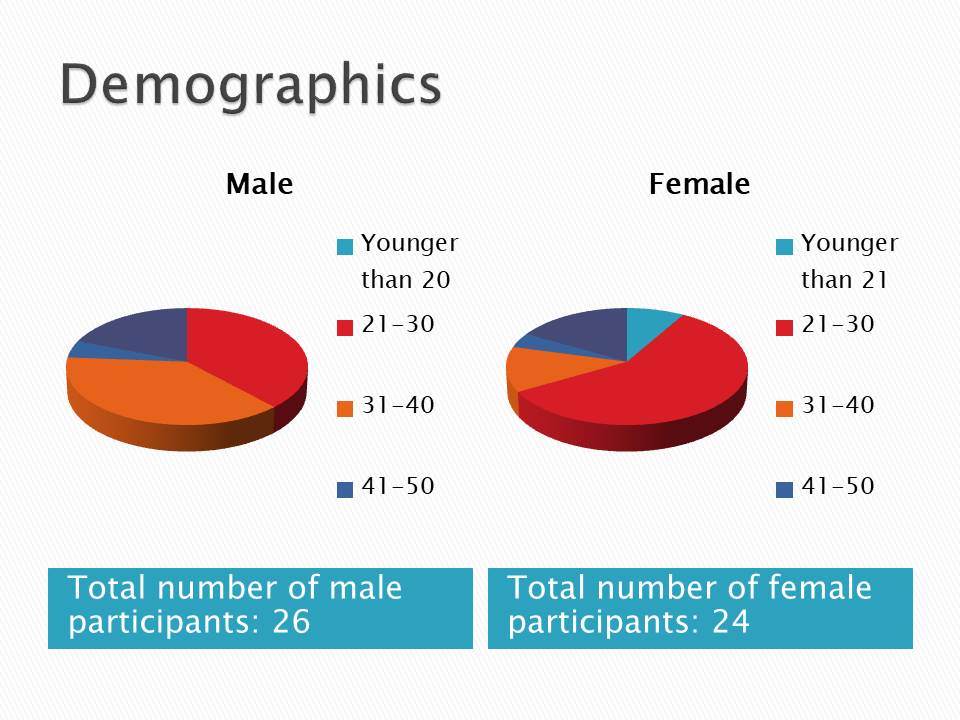
Where do the British people spend their holidays?
Answering the question whether or not they go on holidays most of male and female respondents said “yes”. Only two people (one male and one female) stated that they do not travel. The bar chart reflecting the opinions concerning vacations at home shows that the male and female participants had opposite points of view (the majority of men preferred to stay home, while the majority of women wanted to travel). As for the most favourite holiday destinations of the British people, the two leaders are Spain (chosen by both genders), Italy (chosen by females), and France (chosen by males). However, the most preferable way of travelling for the representatives of both sexes covers several different places during one vacation (this option was selected by 10 women and 12 men). Spain as the most popular vacation destination of the British people in confirmed by The Telegraph (Paris par. 1).The majority of those holidaymakers (26%) who prefer to stay in the UK for their vacations choose London as their most preferred destination (Lazenby par. 8).
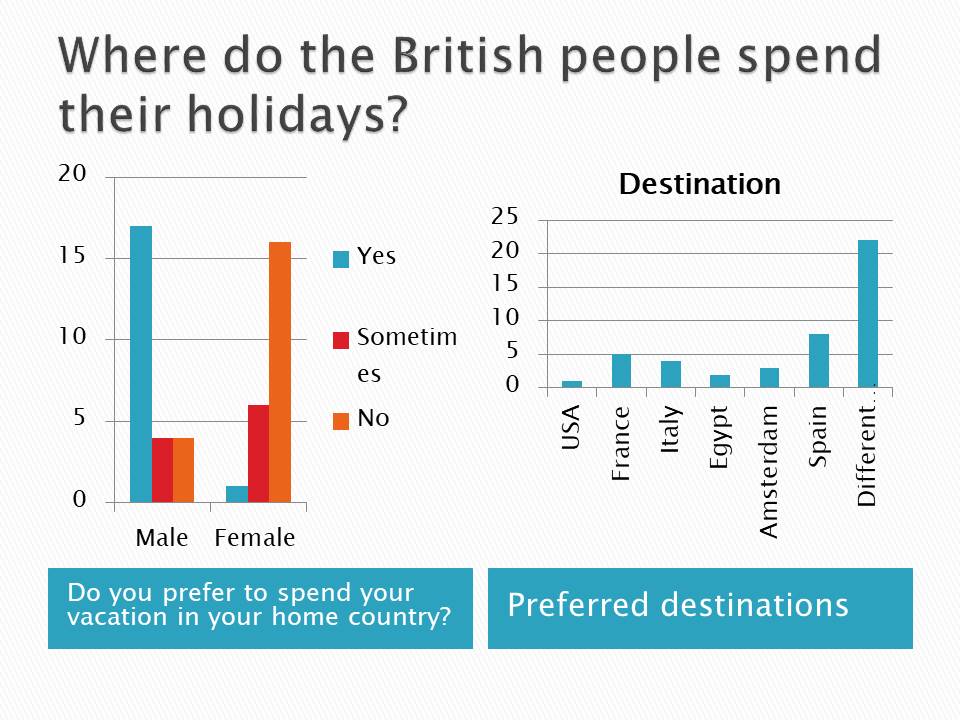
Good Experiences
23 men and 23 women answered the question about their positive experiences travelling abroad. The vast majority of respondents reported positive experiences, only one man said he had no positive experience, and one woman gave no answer. The respondents also marked the aspects that contributed to their positive experiences the most. In addition, among all the respondents 5 women and 4 men refused to comment on this subject. The line chart above compares male and female perspectives on the factors that determine their level of satisfaction with a vacation showing that visiting new places and encountering new cultures is the main interest of both genders. Yet, while women value good weather, men appreciate the opportunity to meet new people.
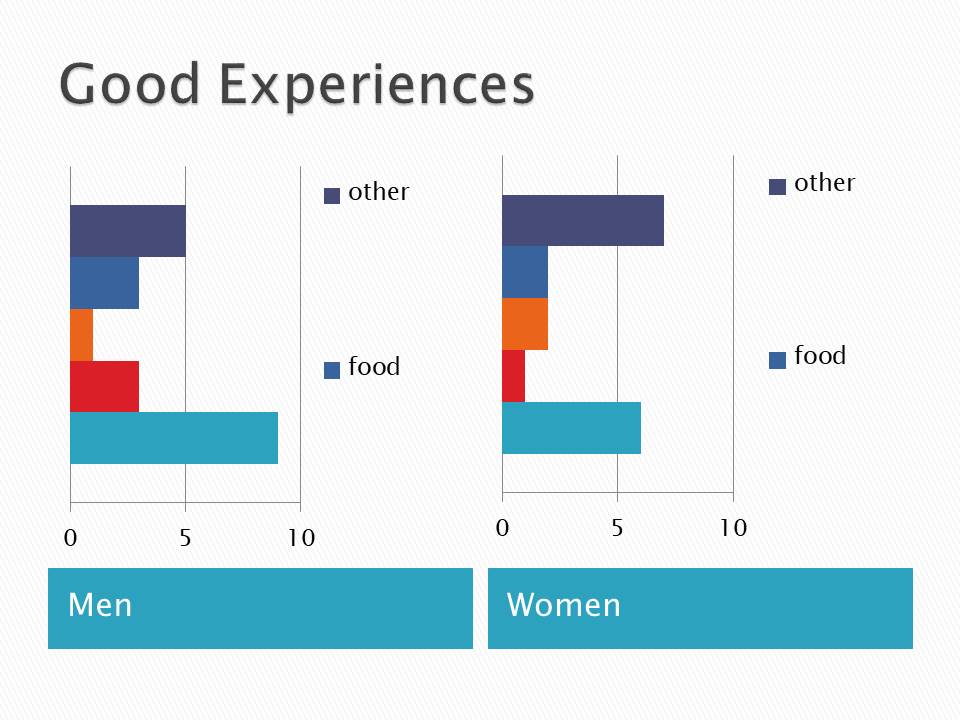
Bad Experiences
Answering the question “have you had bad travel experiences?”, 10 male and 8 female respondents gave a positive answer, while 15 participants of each gender said “no”. This tendency dignifies that the majority of British people enjoy their vacations abroad, yet some of them face unpleasant moments from time to time. The three main categories of bad experiences included delay, bad service and other. The bar chart above demonstrates that bad service was the factor most men felt dissatisfied with. At the same time, women marked “other” category in most cases. Traveling delay is the negative factor of equal importance for the participants of both genders.
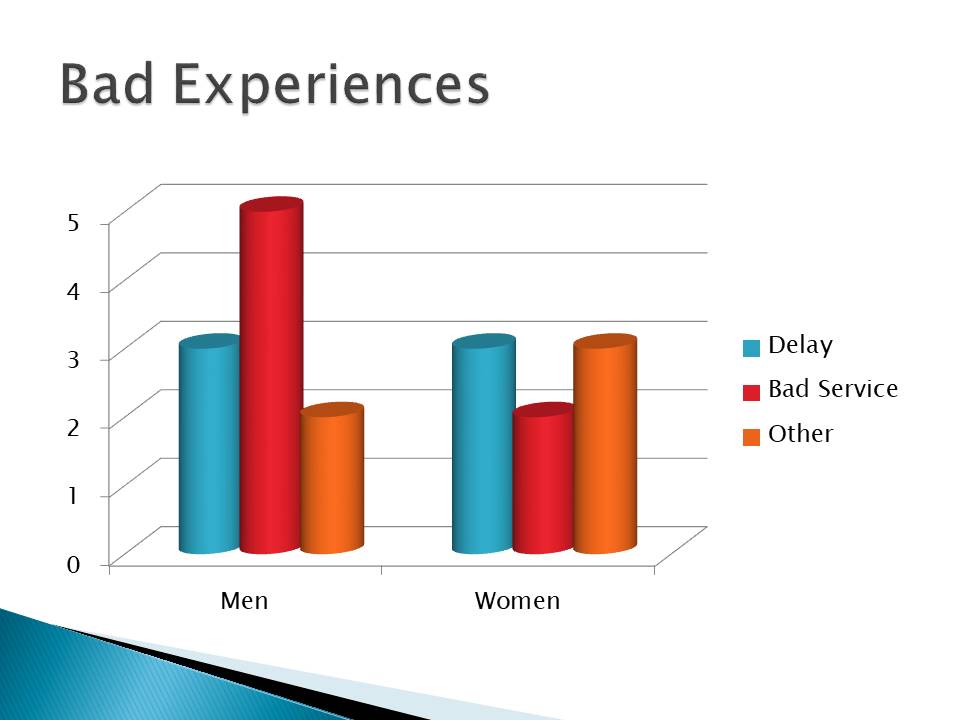
How do British people arrange their travels?
The majority of respondents stated that they have one or two holidays a year, yet in rare cases the participants (2 men and 1 woman) reported having more than 3 vacations annually. When it comes to the planning and arrangements, the majority (17 men and 15 women) stated that they make their own travelling plans and book their arrangements, fewer individuals (8 men and 8 women) admitted that they were not responsible for their holiday plans.
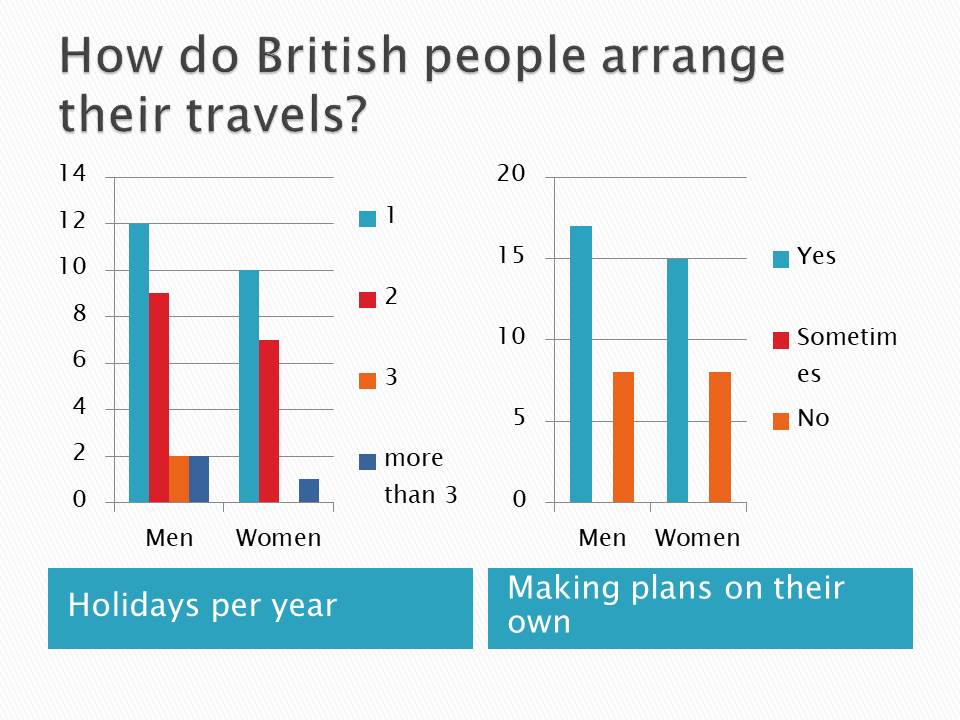
Modes and Companions
The patterns concerning the most frequently chosen means of transportation show that both men and women prefer going abroad by plane, yet men also favour travelling by car. The chart that reflects the company of people the British men and women join for a trip demonstrates almost identical answers – people of both genders choose to go on holidays with their families more often. Interestingly, the category marked as “other” was the close second choice even though it has not been specified what kind of people it included.
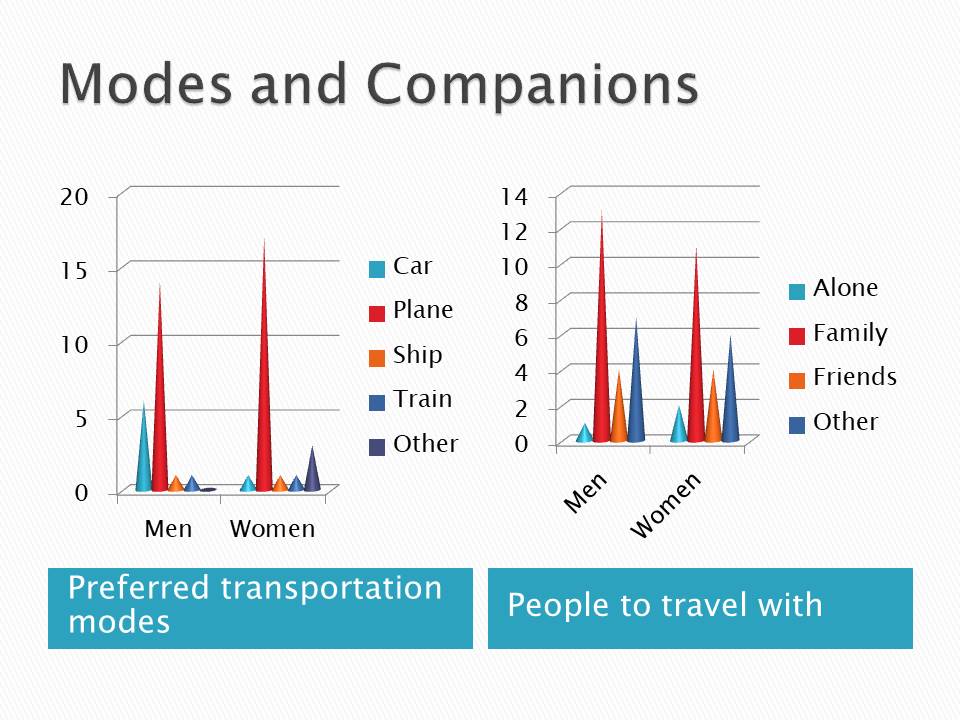
How and where?
The most popular time for vacations is summer – July and August, and the most preferred place for a vacation is the seaside (Where do British people go on their holidays? par. 1-2).
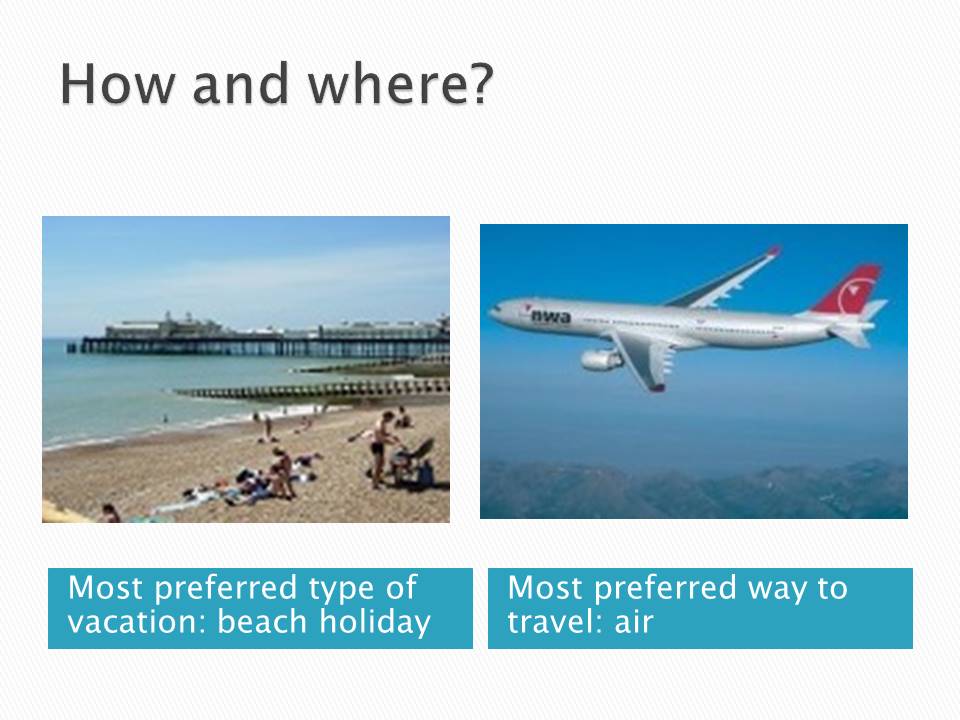
Findings of the Research
The findings of the presented research show that:
- The factors that impact the choices of destinations of the British people are weather and food
- Trying new food, relaxing, and sightseeing -most attractive activities on vacations
- Food and weather – the determinants of the perceived quality of the holidays
Summarizing the findings of the research one may notice that the participants emphasized the importance of the food, climatic conditions, and relaxation as the most important factors that influences their choice of countries to go to and the level of satisfaction by their vacations. These factors remain equally important for the participants of all ages and both sexes. As for the domestic tourism, the UK residents favour the same activities the pursue travelling abroad (sightseeing, relaxing, and walks) (Tourism Alliance 5).
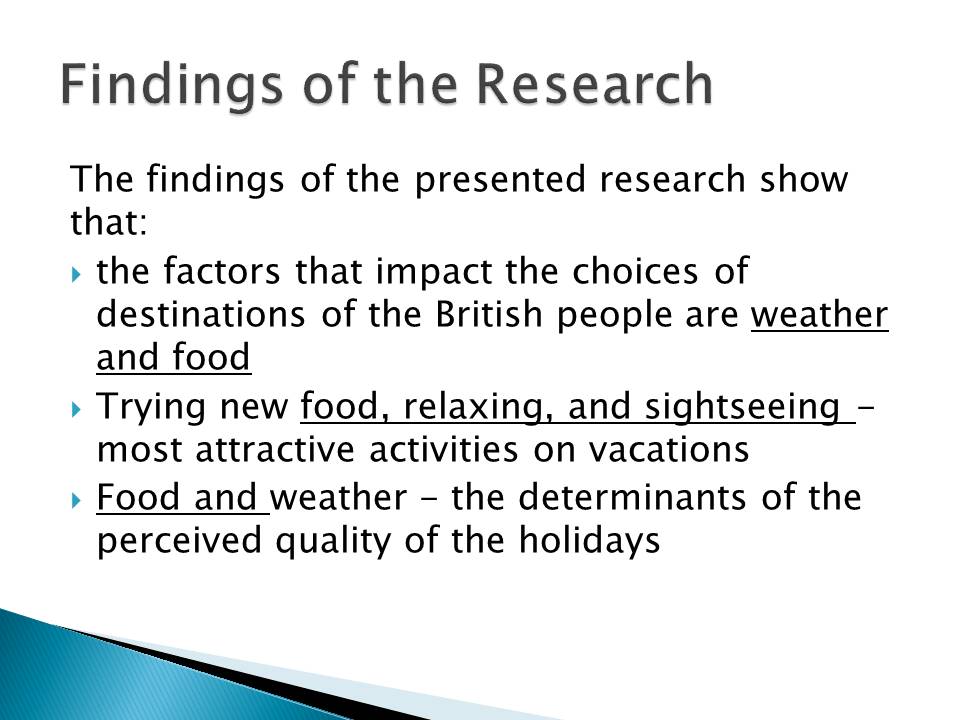
Conclusion
Respondents are:
- Willing to travel, invest into vacations.
- Mainly spend their holidays abroad (Spain, Italy, France are popular destinations).
- Have mostly positive travel experiences.
- Negative determinants: delay, bad service.
- Travel once or twice a year, in the family circle, by plane, make their vacation plans on their own.
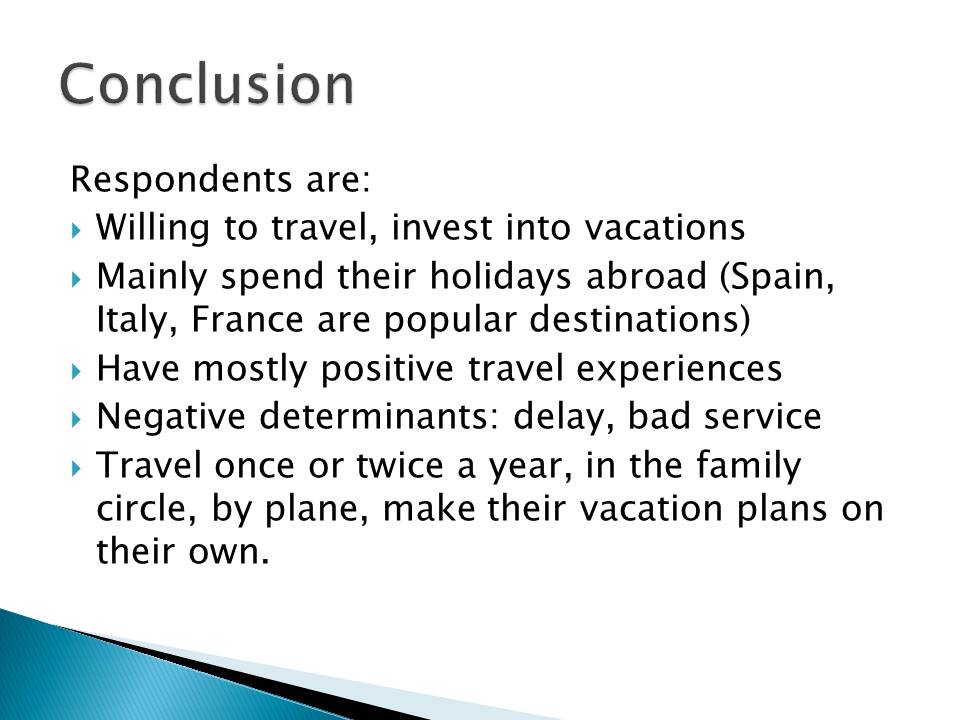
Works Cited
Caution remains in 2014 but Brits expect to spend more on holidays in 2015. ABTA. 2014. Web.
Lazenby, Emma. Brits prefer to holiday at home but what’s your favourite ‘staycation’ destination? 2015. Web.
Paris, Natalie. Spain most popular destination as summer holidays begin. 2013. Web.
Travel Trends, 2013. Office for National Statistics. 2013. Web.
Tourism Alliance. UK Tourism Statistics 2014. 2014. Web.
Where do British people go on their holidays? Project Britain. 2013. Web.